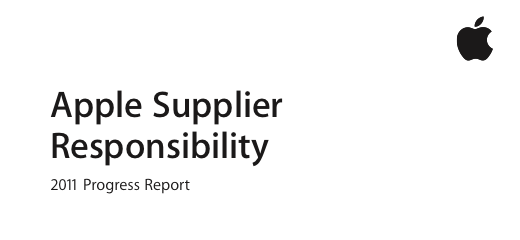Apple has posted an update to its supplier responsibility document that it has been publishing since 2007 with details of its improvements in 2010 and the core violations that occurred in 2010. Jump the break for a brief re-cap of the report. You can download a full copy of the report from Apple’s Supplier Responsibility website.
- There were 37 core violations including; 18 facilities which charged workers excessive recruitment fees, 10 facilities which employed underage workers, 2 cases of worker endangerment, 4 facilities where records were falsified, 1 case of bribery and 1 case of coaching workers on how to answer auditing questions.
- Apple expanded its training and support initiatives aimed at empowering workers, including enrolling 16,000 into it’s Supplier Employee Education and Development program which offers English and Computer classes
- Apple stepped up its efforts against unethical hiring practices such as overcharged recruitment fees and dedicated additional resources to auditing suppliers in countries where there was a high risk of migrant workers suffering from such unethical practices.
- 49 underage workers were discovered in factories, Apple conducted research on those factories and found insufficient policies and procedures to prevent such employment. As a result Apple has required those factories to institute more thorough checks and procedures as well as to enforce them by third-party recruiters.
- The sourcing of conflict-free metals was also a focus for Apple in 2010 and they began mapping their supply chain to the smelter level to gain knowledge of which supplier is using which metals and where they are sourcing said metals. Apple also joined forces with the EICC and the Global e-Sustainability Initiative (GeSI) to audit smelters.
- Apple audited 127 suppliers in 2010, with 97 being new audits. Furthermore 40% of those suppliers had never been audited for social responsibility by any other company.
- In 2010 Apple learned of 137 workers suffering from adverse health effects because the supplier they worked for; Wintek used n-hexane as a cleaning agent. Apple required the removal of n-hexane from production lines and a new ventilation system. So far Apple has received no information on any more health problems from chemical exposure.
Our priorities for 2011 are to:
• Extend the reach and improve the quality of Apple-mandated social responsibility training so that more workers understand their rights and how to communicate with factory management.
• Equip additional suppliers with Apple SEED classrooms to help workers continue their education while remaining employed.
• Collaborate with industry groups and NGOs in China to address key issues— such as working hours, underage labor, and employee well-being—through root cause analysis, more aggressive audits, stronger requirements for correc- tive and preventive actions, and expanded supplier training and assistance.
• Drive conflict-free verification measures to smelters in our supply chain, and require our component suppliers to source tantalum and tin from conflict-free producers.
[Source @Gartenberg]


